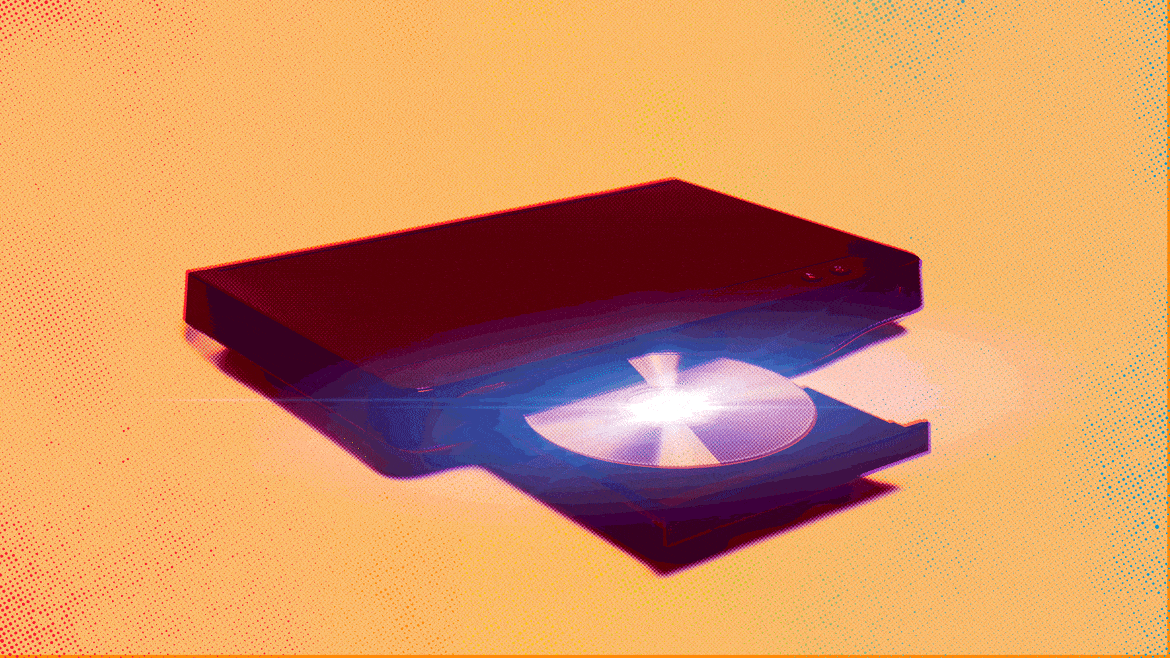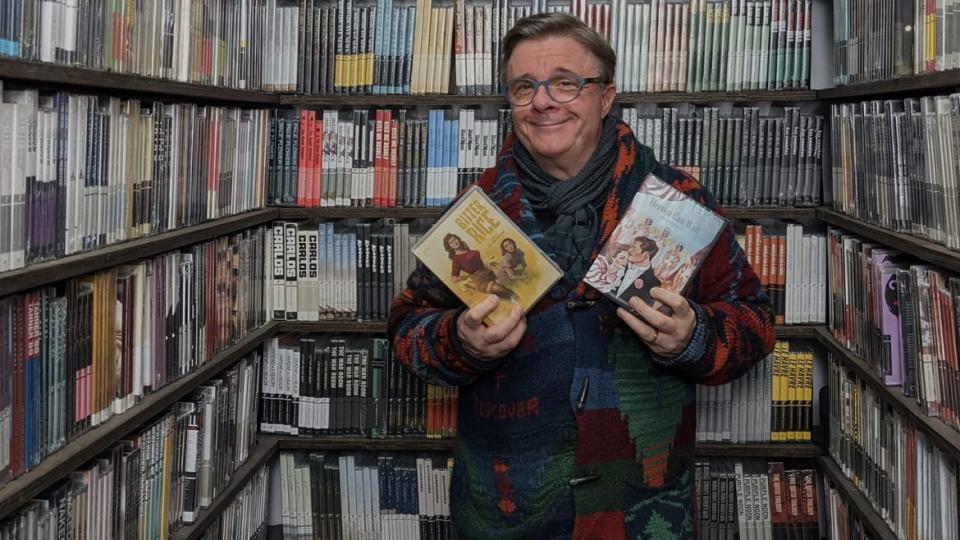DVD Special Features Are a Lost Art, Thanks to Streaming

- Oops!Something went wrong.Please try again later.
As lovers of media, we’ve all made a dark deal. In order to participate in just about any of today’s seemingly effortless methods of entertainment consumption, we must accept that we do not truly own any of the things we love. It’s likely that folks born after the VHS or DVD generation have never held their favorite movie in their hand. They probably haven’t ever thought to want that, or simply don’t see the need.
But for those of us who had the privilege to enjoy physical media, digital media’s boundary lines are obvious. If you owned the DVD boxset already, you never had to worry about Warner Bros. taking your favorite show away from you. A movie leaving Netflix at the end of the month? If you already have a copy of the movie on a disc, it doesn’t matter if it’s streaming or not. And no matter how convenient streaming can be, it has failed to recapture the most magical thing of all: the DVD special features.
Watching Feature-Length TV Recaps on YouTube Is Better Than Watching TV
There is a tragedy, to me, in the knowledge that the new generation of arts consumers is sorely missing out on one of the great material advantages of the physical media era. These hours and hours of behind-the-scenes materials unlocked insights and inspired obsessions that the bite-sized, hyper-monetized media landscape of today just can’t touch.
I’m talking director’s commentaries. Cast interviews. Storyboards. Deleted scenes. Easter eggs. Home video made all of these available to view without any added effort or a recurring subscription to something like “Carolco Plus.” (Can you imagine, though?!) A disc wasn’t just a show or movie; it was an entire experience. It was an education, or an enlightenment, or even just extra entertainment. With the entire contained disc curated to highlight the film, it was easy to become totally steeped in a little world. It wasn’t just a movie presented by whichever interchangeable streaming platform houses the content; it was a movie presented by the people who cared about it.
Did I forgo nights out in high school to stay home and watch all of the screen tests with Jeremy Sisto as Jack Dawson on the four-disc Titanic DVD set? Yes, I certainly did. Did I listen to the commentary track on the disc for Step Brothers, where Will Ferrell, Adam McKay, and John C. Reilly sing through the entire thing, more than the actual movie itself? Of course. I can still remember the boys singing an improvised crooner tune about Altadena, stumbling into a rap song about kimchi, and attempting to deliver a ’90s sitcom-era “theme song” for Step Brothers on the fly. Did I hide from my family the rest of Christmas Day after I was gifted the Newsies DVD, because I needed to see for myself just how Kenny Ortega vibed on sets before the High School Musical days? Yes, I was an incredibly cool, popular teen. But I was also nurturing my love of film and television by watching not just the movie, but also the supporting materials—the researched, carefully packaged, exclusive content that painted a fuller picture of what I’d just watched.
This is the level of nerdery that DVDs enabled in me: At age 15, I adored Conan O’Brien, so I bought the full DVD sets of the seasons of The Simpsons that he wrote for. I scoured a comedy message board to figure out what special “code” I had to press on the DVD player’s remote control number pad to activate the “bonus” commentary with Conan O’Brien on his famously penned Season 4 episode “Marge vs. The Monorail.” Lo and behold, the internet did not fail me. I typed “1-5-0” into the keypad and up popped a new icon of a megaphone on the menu screen. When I clicked it, I received the hard-won commentary of my dreams. Conan O’Brien delved into his inspiration for the episode, pointed out specific pop culture homages that would have otherwise absolutely flown over my head as a teenager, and offered up the various insecurities he had during production. I soaked up everything I could about the writing process and came away inspired, in awe of how something that I loved so much could be created by awkward, goofy human beings who weren’t that different from me.
Something felt sneaky and special about knowing that not everybody would discover this special feature on that DVD set, and that I had to work for it. Is that gatekeeping? Sure, and I’m fine with that. Some low-stakes gates, like a DVD commentary on a now-20-year-old episode of television, can be kept. It was a scavenger hunt, where the only reward was becoming more of an isolated nerd.
Nowadays, it feels impossible to discover these secret delights on your own. You can’t take in a piece of media without knowing ahead of time what the “hot takes” are, or what side of the discourse you fall into by liking or not liking it. You stream with a phone in hand, or in a browser tab next to your Twitter feed; it’s impossible not to be embedded in everything adjacent to what you watch at all times. When the Step Brothers commentary finished, I wasn’t diverted to a hollow, shocked-face-thumbnail “reaction” video immediately after. I had the serenity and space to process the material myself, without the internet immediately telling me how I was supposed to feel about it.
We live in an instant world with instant products that beget instant responses. We’re not incentivized to buy a Blu-ray when it’s so much easier to just check out the movie with a few clicks of the remote or touchscreen. But the trade-off for that ease-of-use is us offering ourselves up as the product, our viewings meant only to be another delivery system for conglomerates to gather our data and enrich themselves via our attention. When I see a 20-second, out-of-context clip on Twitter or TikTok, with fans posting about how excited they are to see said actor eating something weird on a talk show or taking a lie detector test, it breaks my heart. These quick, punchy, gimmicky press tour interviews designed for meme-ing and maximum view counts lack what so many of the rich, in-depth, behind-the-scenes features from my DVD extras of yesteryear contained: actual information.
Civil War Porn and Fish Tongues: Inside Howie Mandel’s Twisted TikTok
Special features were never designed to go viral—they were created by craftspeople who wanted to inspire and educate other craftspeople. I don’t know a better way to describe it other than that it felt like we as viewers were respected by creators in the physical media era, whereas so much of today’s media consuming adventures feel like pure manipulation from a predator in the animal kingdom trying to put its prey at ease. I want to scream, “Young fans, you deserve so much more than this.” You deserve to enjoy an entertainment experience where you and your interests are not being similarly consumed in the same moment.
The streaming takeover was bound to happen, and I don't begrudge it and its popularity. However, it is semi-tragic to think of the post-DVD generation, who have never truly physically "owned" a film or season of their favorite television show in their entire lives. They can only hope to be so lucky as to find a hyper-structured 4-minute press junket interview of one of their faves, out there in the muck and mud of YouTube. It’s not the fault of our youth; studios don’t prioritize creating DVD extras, because consumers largely aren’t buying DVDs anymore. In the era’s heyday, a film’s production was accompanied by a second production documenting the process and experience of the actors and creators on set. I understand why a budgeting department could analyze a cost estimate and decline to put effort into this in today’s media landscape, but that doesn’t mean that I don’t I think it is a net loss for the spirit of filmmaking and a disservice to the craft.
I haven’t lost my faith completely in the future of the special feature. The Criterion Channel, for example, offers a cornucopia of supplementary features for its films. I have a particular soft spot for the interviews with modern filmmakers that often accompany the collection’s older films; I appreciate the permission Criterion gives these interviewees to gush obsessively over the influence the classics have on their current careers. I’m guessing, however, that the typical Criterion subscriber is someone like myself—a film nerd who owns plenty of physical media and their attendant special features already.

And no matter the service, streaming platforms could disappear at any moment, if an investor takes over and decides to unplug the server (RIP, FilmStruck). YouTube is an incredible, equitable resource for film and television history nerds. You must be picky, though, and you must be willing to do some digging beyond what the algorithm shoves in your face. I could not have rolled my eyes harder when YouTube served me a video of a director discussing a pivotal moment of his film, with the title being something to the effect of, “Director Breaks Down THAT Iconic Scene.” The video was 7 minutes long, had millions of views with comments like “his mind!!!” and was sandwiched by ads for meal boxes. I wanted to scream into the void an advertisement of my own: “If you like this, you’ll LOVE this little concept called DVD commentaries! There, you can watch the director break down the entire movie! Without ads or a tech giant tracking you as you do it!”
It’s not the consumers themselves who I’m upset with for eating this sub-par bonus content up. It’s the culture that didn’t realize what we had when he had it, and the industry that puts profits before the sanctity and responsibility of artistic preservation. The ritual and focused attention of the DVD viewing process offers the filmmaker (and yourself as the viewer) the respect and ceremony that is deserved to fully appreciate the work. The shocking, inspiring amount of work and human power that goes into getting a film made deserves a little more pageantry and attention than what we give to a recycled spon con reel we scroll past or a fitspo post from an old co-worker.

When I truly love an entertainment figure and want to soak up something they’ve created or an interview they’ve given, I don’t want that to be a harried experience on my lunch break or have the video pause every eight seconds when a slurry of group texts come through. There are so many crucial human experiences that we as a species have relegated to doing “on-the-go,” when we can fit it in, before the subway ride’s WiFi drops.
Capitalism is to blame, ultimately. Our response to art is what makes us human beings, and I mourn the mainstream encouragement to make time and space for experiencing art, rather than the modern solution of naming it “content” and treating it as a disposable vehicle designed to keep addicted eyes glued to a device.
Last but not least, I cannot leave you today without mentioning that, due to the drop in demand for home video, blooper reels are not receiving the care and attention they deserve in film production timelines. I believe that this is an incalculable loss for our sense of joy and larger cultural preservation. Bring! Back! 20-minute blooper reels!!!!
‘Rush Hour 3’ Is a Terrible Movie With the Best Blooper Reel of All Time
I am not asking you, dear reader, to go back in time. I am not asking you to unsubscribe from all of your streaming services and become a hermit. I am asking you to take a beat and consider what pieces of media are most dear to you. Are you one of the millions of folks who post about rewatching The Office on a loop? You are doing yourself a huge disservice by not scooping up those DVD box sets and settling in with your old pals via an item that you own, and that no company or conglomerate can take away from you. It can’t jump streaming services and leave you panicked that your comfort show is gone. You can preserve a moment in time that is meaningful to you and make a true investment in a creation that you love. Plus, there’s no monthly subscription fee. And with recent catastrophes like Warner Bros. Discovery deleting tons of beloved shows from HBO Max for tax purposes, it’s only becoming more apparent that we must secure, preserve, and protect the media we love in its physical form. It might be all we’ve got at the end of the day.
Get the Daily Beast's biggest scoops and scandals delivered right to your inbox. Sign up now.
Stay informed and gain unlimited access to the Daily Beast's unmatched reporting. Subscribe now.

